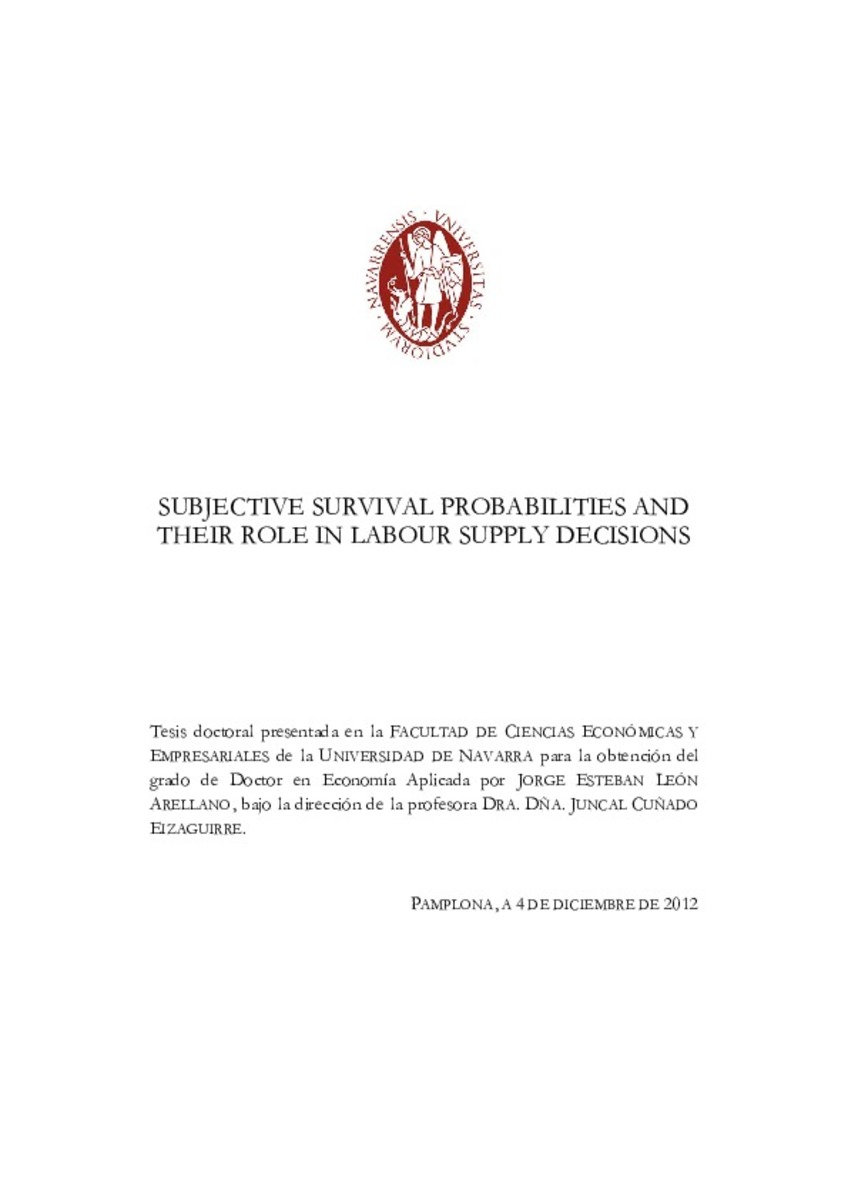Full metadata record
| DC Field | Value | Language |
|---|---|---|
| dc.contributor.advisor | Cuñado, J. (Juncal) | - |
| dc.creator | León-Arellano, J.E. (Jorge Esteban) | - |
| dc.date.accessioned | 2013-04-04T09:48:58Z | - |
| dc.date.available | 2013-04-04T09:48:58Z | - |
| dc.date.issued | 2013-04-04 | - |
| dc.date.submitted | 2013-01-16 | - |
| dc.identifier.citation | LEÓN ARELLANO, Jorge Esteban. “Subjective survival probabilities and their role in labour supply decisions” Cuñado Eizaguirre, Juncal. Tesis doctoral. Universidad de Navarra, 2012. | es_ES |
| dc.identifier.uri | https://hdl.handle.net/10171/28207 | - |
| dc.description.abstract | According to the Life Cycle Model (LCM) an economic agent would take a retirement decision so that she maximizes lifetime utility. However, because there is uncertainty about when someone will die, longevity expectations should play a significant role on deciding when to stop working. This Thesis analyses these issues in three different Chapters using data drawn from the ¿Survey of Health, Ageing and Retirement in Europe¿ (SHARE). It seeks two concrete objectives. Firstly, we explore individuals¿ longevity expectations ¿ more commonly known in economic literature as Subjective Survival Probabilities (SSPs) ¿ in order to determine if we could confidently use them as main input in a retirement model. Secondly, once SSPs are validated, in the third Chapter we to test if they play a role in labour supply decisions in the same fashion the LCM suggests. Overall, we have found that SSPs do satisfy the three specific properties that expectations should satisfy according to Hurd and McGarry (1997) and therefore they can be used confidently to estimate models of decision-making under uncertainty. Specifically, we found that SSPs in SHARE covary with other variables in the same way actual outcomes vary with the variables. Furthermore, their evolution is coherent with epidemiological evidence and with previous studies, and they predict mortality. We have also found that expectations of longevity do play a significant role when taking retirement decisions only in the case of females. In particular, it is found that females who expect to live longer have a lower probability of retiring. This finding is consistent with the LCM | es_ES |
| dc.language.iso | eng | es_ES |
| dc.publisher | Universidad de Navarra | es_ES |
| dc.rights | info:eu-repo/semantics/openAccess | es_ES |
| dc.subject | Comportamiento del consumidor | es_ES |
| dc.subject | Teoría y modelos de empleo | es_ES |
| dc.subject | Econometría | es_ES |
| dc.subject | Materias Investigacion::Economía y Empresa | es_ES |
| dc.title | Subjective survival probabilities and their role in labour supply decisions | es_ES |
| dc.type | info:eu-repo/semantics/doctoralThesis | es_ES |
Files in This Item:
Statistics and impact
Items in Dadun are protected by copyright, with all rights reserved, unless otherwise indicated.






